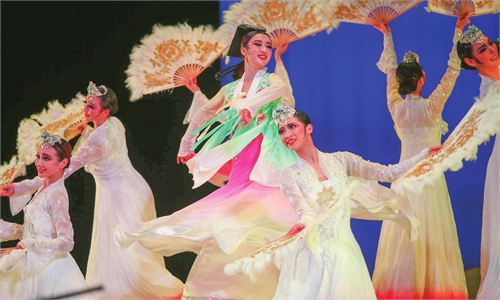IN-DEPTH / IN-DEPTH
Encouraged by Xi’s letters, grassroots Party officials, young trailblazers in East China advance rural revitalization with firm resolve
With rural revitalization as a primary focus, China has attached great importance to issues related to agriculture, rural areas and farmers. In President Xi Jinping's speech at the central rural work conference in December 2022, he called for efforts to vigorously promote the modernization of agriculture and rural areas, and to expedite the fortification of agriculture.
Xi, also the general secretary of the Communist Party of China (CPC) Central Committee and chairman of the Central Military Commission, emphasized that Party secretaries at province, city, county, township, and village levels must be held accountable for the work of rural revitalization, which echoed the content of his letter reply to the Party members of Hengkantou village, Lianglong township in Yuyao city in East China's Zhejiang Province in 2018.
Xi paid a visit to Hengkantou village ahead of the Chinese New Year in 2003 when he was the secretary of the Zhejiang Provincial Committee of the CPC, encouraging the villagers to shake off poverty and strive to build a prosperous village.
On the first working day of the Lunar New Year in 2003, the village Party committee and village leadership wrote a letter to Xi to report on their development plans, targets, and measures for the village. Xi expressed his support in his first reply letter on February 11, 2003 and encouraged local villagers to keep the spirit of hard work and self-reliance, emancipate the mind, keep pace with the times, accelerate the construction of old areas, and get rid of poverty as soon as possible.
Work with firm resolve
Bearing Xi's guidance in mind, the village Party committee led the villagers to change the once underdeveloped, remote revolutionary base in the mountainous area into one of the most renowned, civilized and well-off villages in China, incorporating revolution-themed tourism, utilizing green resources, and expanding its specialized organic agriculture from 2013 to 2017.
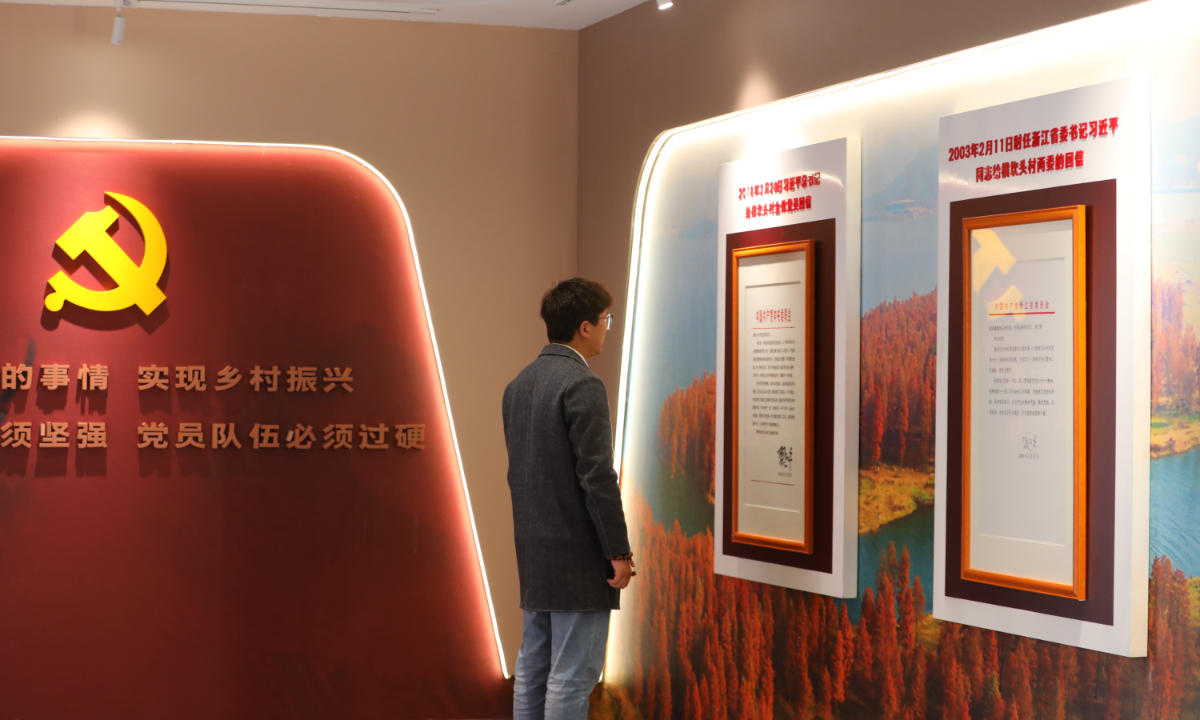
The per capita disposable income of Hengkantou's villagers increased from less than 2,700 yuan ($388.50) in 2003 to 27,568 yuan in 2017, a 10-fold increase.
In 2018, Party members wrote a second letter to Xi to report the changes in the village and their resolve to lead the villagers in creating a beautiful home.
Xi said in his second reply letter on February 28, 2018, that he was pleased to receive their letter and still remembered his visit to the village in 2003. He said he was also pleased to know that the village had been transformed into a well-off and civilized village, and that people's livelihoods had been improved due to the hard work and leadership of the village officials.
On February 28, 2023, the fifth anniversary which marks Xi's second reply letter to the village Party members, the Global Times reporters visited Hengkantou village, and found that visitors from around China read Xi's signed letter in the conspicuous place of the village's showroom. The letter reads: "Party organizations must work with firm resolve, and Party members must always hold themselves to the highest standards in a bid to handle rural affairs and pursue rural vitalization."
Qiu Minbo, deputy Party secretary of Hengkantou village, told the Global Times that the per capita disposable income in the village jumped to 47,108 yuan in 2022, another significant increase of 71 percent compared with 2017, with his face radiant with pride and excitement.
Qiu said that in addition to income from traditional agriculture and tickets revenue from red tourism, they also developed specialized organic farming based on great ecological environment. Leisure trains take visitors to pick cherry and other fresh vegetable and fruits, which is very attractive to tourists.
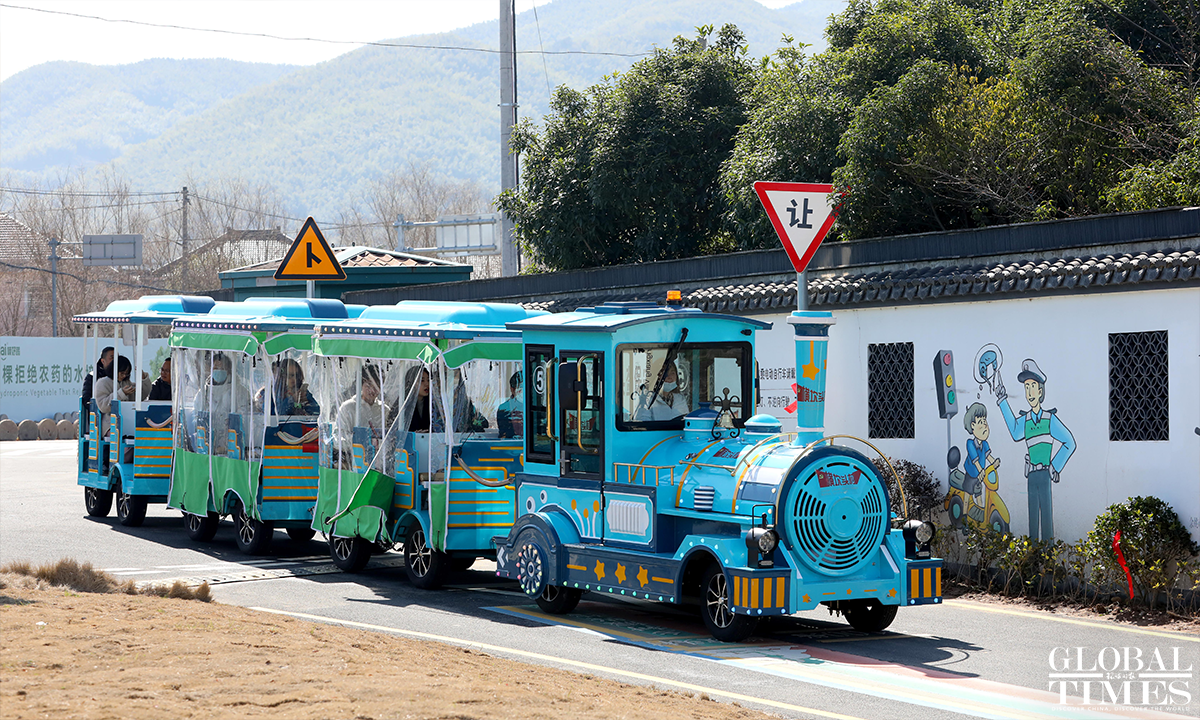
"How Party members piloted the planting of cherry trees in the village is an unforgettable example of how the village Party committee played its role," Qiu recalled.
"As a traditional rice cultivation area, villagers were hesitant to shift to the cultivation of cherries in their field in 2018. Party members then led the way in the experiment. We made it. The revenue from every mu (666.67 square meters) of cherry-cultivated land reached 10,000 yuan, compared with 1,000 yuan from rice cultivation. Thus, cherry cultivation became a main income source not only for our village but for the whole town and beyond," Qiu said.
According to Qiu, the government-invested highway and road upgrades around the town have played a vital role in guaranteeing smooth traffic for the transportation of both fresh agricultural products and tourists nationwide.
Hundreds of hiking enthusiasts in the Yangtze River Delta Region experienced new hiking routes in the Siming Mountain area on February 28 as the "Siming Mountain, China Red" Travel Festival was launched. As one of the 19 former Anti-Japanese Base sites in China, Hengkantou has promoted and expanded its "red tourism" industry and revolution-themed education. The village has thus become a popular scenic spot among Party members and the general public across China.
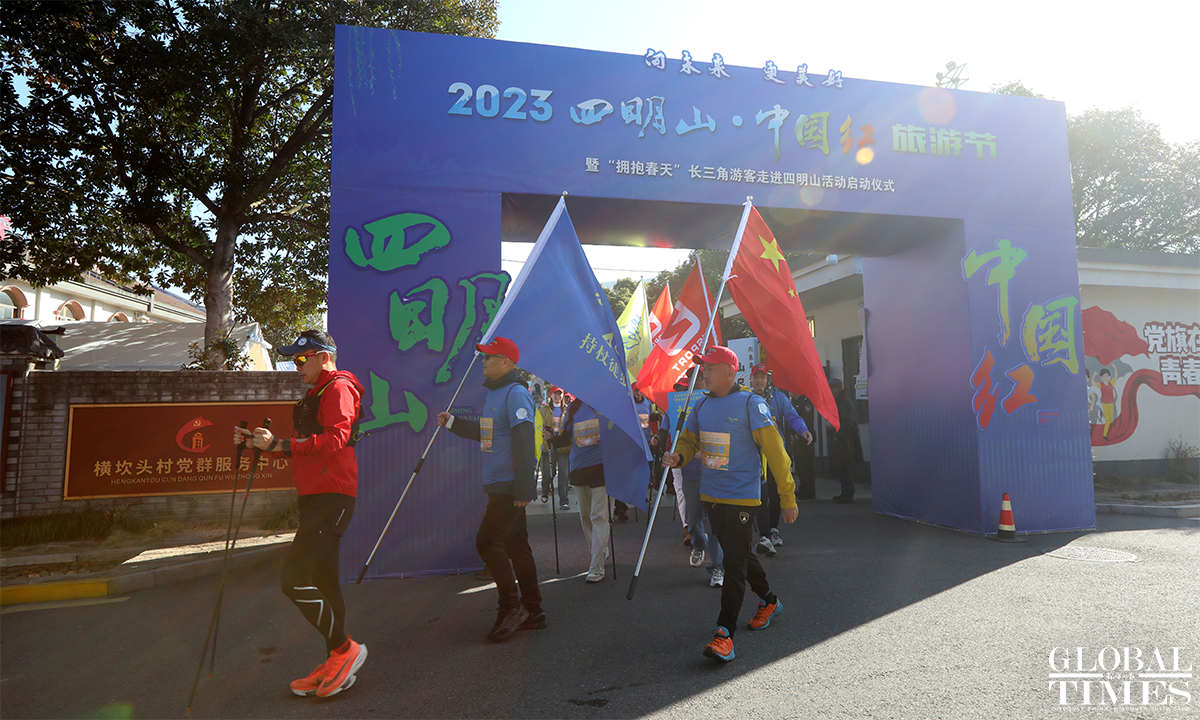
Innovative farming
Besides the tradition of deep plowing, red tourism, and generating income from local intangible cultural heritage food-making skills, Party members and villagers have never stopped pursuing new ways to innovate and upgrade farming.
Wang Wenyan from Lianglong township is a pioneer among them.
"Traditionally, being a farmer was not widely regarded as a decent career. I used to be labeled as a professional in the overseas tourism and TCM sectors and now I just want to break down the social stereotype and label myself as a farmer who is doing a wonderful job," Wang told the Global Times.
"I have been to more than 70 countries in the last 20 years, seeing great villages and farmers in countries such as Japan and the UK. I believe my hometown Lianglong can also be a pleasant and livable place where people can be proud of being a farmer and conveying farming culture to the country and the world," Wang said.
Wang is now trying organic farming, healthy food, and launching a "bed and breakfast" business in her hometown. She hopes that her previous experiences will help her communicate more with overseas industry insiders and promote the "new Chinese farmers" concept overseas.
The development story of Hengkantou village is a vivid illustration of rural revitalization and the way that grassroots-level Party organizations and members have led farmers out of poverty, helping them to create villages that are prosperous and civilized.
Successful Wandi case
Hengkantou is not alone, as President Xi's letters have also influenced and guided primary-level Party members in many villages across China, which have been playing a pioneering and exemplary role in the country's pursuit of rural revitalization and common prosperity.
Wandi village in Yinzhou district in Ningbo city, Zhejiang, 81 kilometers away from Hengkantou, illustrates a different picture of the similar journey.
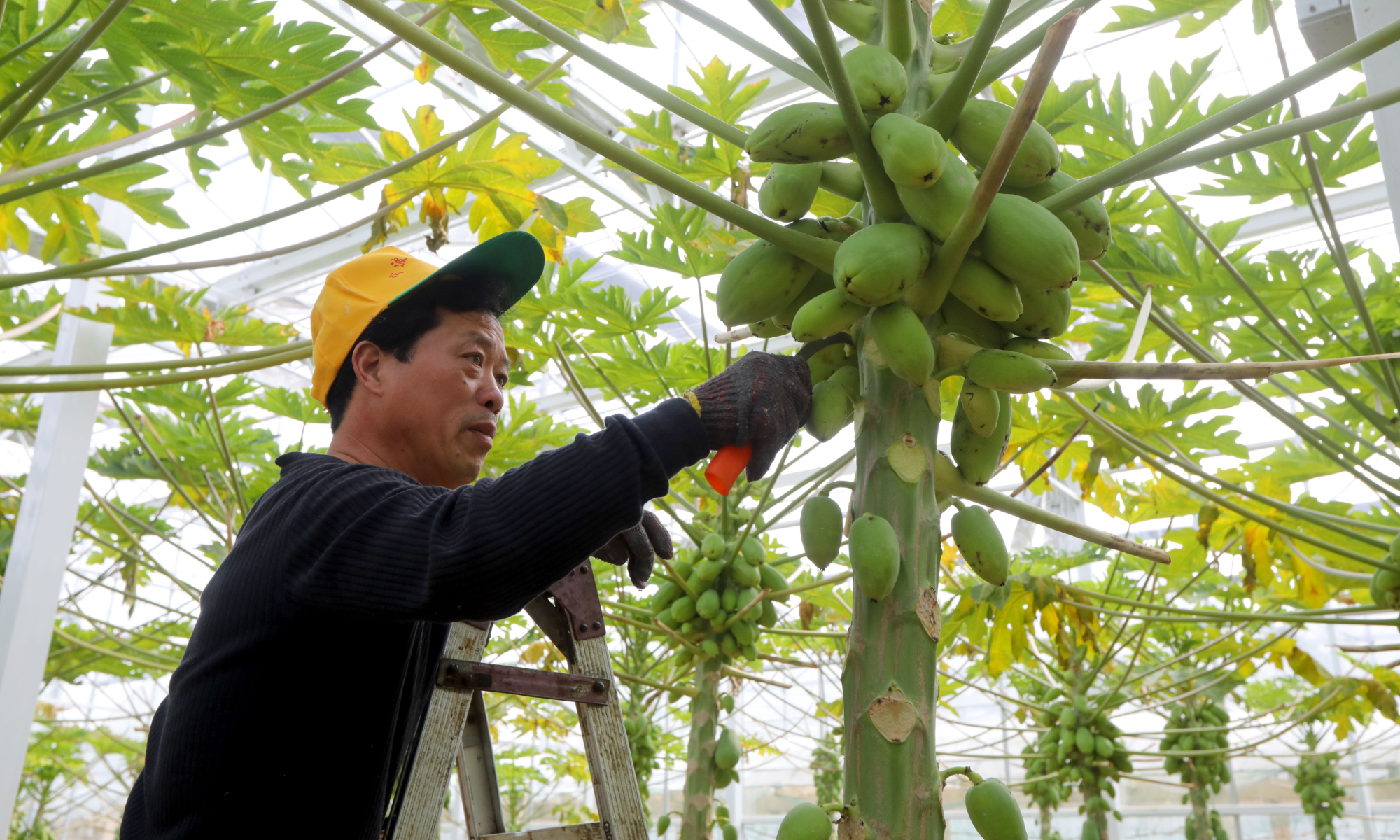
Once a poverty-stricken village that locals described as "poor and white," Wandi has been pursuing the modernization of agriculture and the rural area under the powerful leadership of the village Party committee for the last 40 years.
The per capita disposable income of Wandi village reached 72,500 yuan in 2022, compared with 20,133 yuan of China's national per capita disposable income of rural residents, and 49,283 yuan of urban residents in 2022.
How can Wandi village perform in such an outstanding way?
Both officials in Ningbo and villagers in Wandi told the Global Times that the village's veteran 77-year-old Party secretary, Wu Zumei, is the person who has led the village in integrating the development of primary, secondary, and tertiary industries based on local resources to tap into multiple types of value in the village.
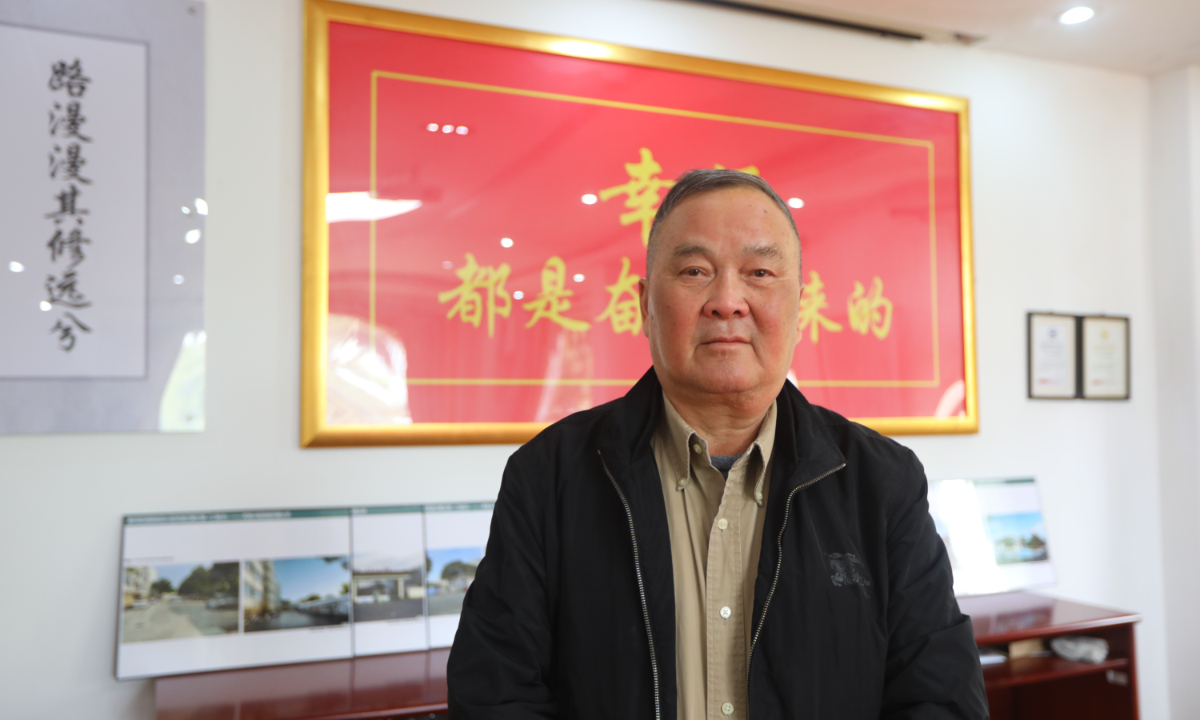
Under the Party leadership represented by Wu, leading village-owned enterprises have been developed, all forms of businesses have been boosted, and self-developed brands have been established. Starting from agriculture, then heavily relying on the export-oriented industry, the village has successfully promoted the whole-chain upgrading of rural industries and their market competitiveness as well as the capabilities of sustainable development.
President Xi pointed out in his speech at the central rural conference: "We must align strengthening the foundation of collective ownership, and safeguarding and realizing the rights of farmers' collective members with activating resource elements, so as to improve the separation of rights and interests over rural collective resources and assets, and make sure farmers can share more of the fruits in the reform."
Wandi village proved to have done a good job to guarantee that farmers' collective members can share more in the fruits of the process of reform and rural revitalization, which, in turn, has made the villagers even more united in seeking common prosperity.
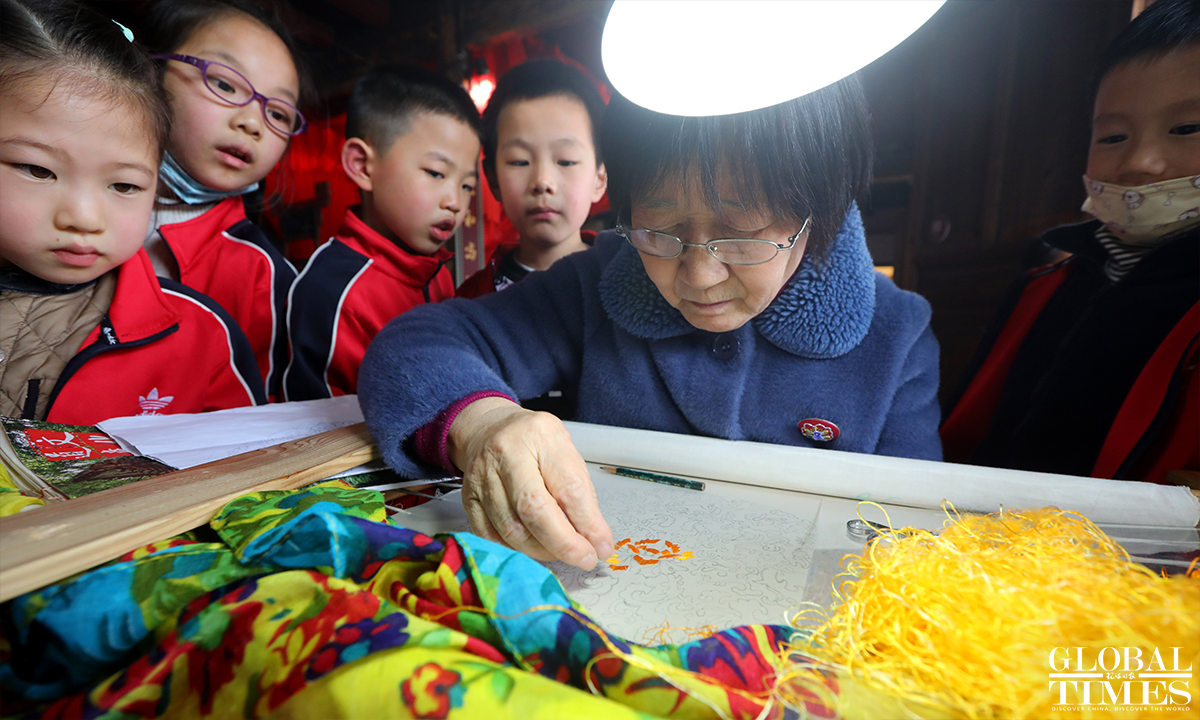
The village had 1,190 registered collective farmers as of 2022 based on national policy and village regulations. In 2022, the village earned a total of 44.58 million yuan of disposable income, and in it, 7 percent was from agriculture, 8 percent from tourism, 16 percent from industry, 30 percent from services, and 39 percent from investment, Wu Lina, the village's publicity official, told the Global Times.
Based on regulations, 25.50 million yuan was equally divided among the 1,190 collective farmers as stock dividends while the remaining 20 million was passed down for the village's future development. The policy has been welcomed and supported by the villagers as they trust the Party committee and village leadership, who have helped villagers live a better life.
Slogans and principles
"Three slogans have guided us in different periods over the last 40 years. They are 'poverty gives rise to the desire for change,' 'long live entrepreneurship,' and 'people first,'" Wu Zumei told the Global Times, explaining that thanks to the national policy's guidance and support, the Party committee could have advocated these encouraging and inspiring ideas to fight against poverty, pursue rural revitalization, and seek common prosperity with the villagers.
"As a Party member, I have shared three principles with other Party members in our village. They should be willing to work harder, willing to self-criticize and be criticized, and willing to sacrifice personal economic interests," Wu Zumei said.
Wu's spirit has been inherited by the Party members of the younger generations in the village, including his successor, the current village Party Secretary Cai Guocheng (born in 1966), and Wu Lina (born in 1991), the youngest Party committee member in charge of publicity.
Both Party committees in Hengkantou and Wandi villages were awarded the honor of China's excellent primary-level Party organization with a number of Party members also winning honors and awards.
Through talking with village officials, Party members and local villagers, visiting organic farms equipped with computer-assisted operating system and production lines that manufacture export-only tools, the Global Times reporter witnessed vitality, pride, and positive attitude and confidence toward a brighter future among the people here, young and old.
They are just the microcosm of pioneering Party organizations and individuals who are "crossing the river by touching stones" in China's pursuit of rural revitalization and common prosperity as China boasts an agricultural population of 510 million.
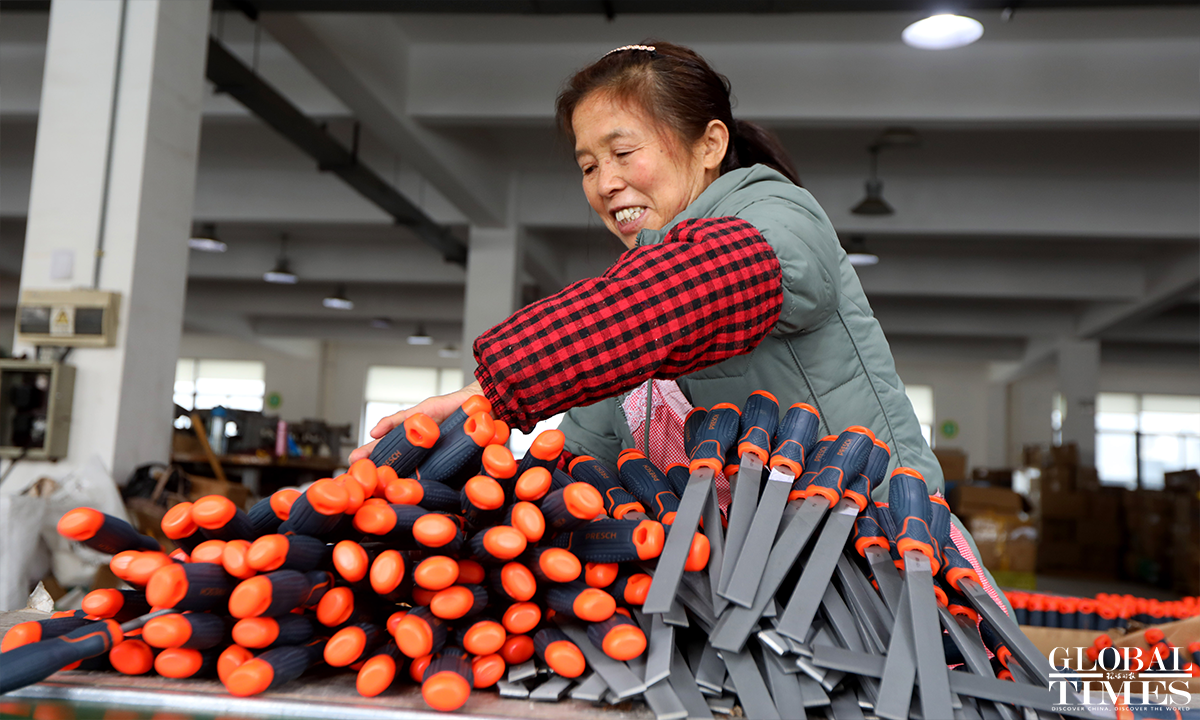
Xi, also the general secretary of the Communist Party of China (CPC) Central Committee and chairman of the Central Military Commission, emphasized that Party secretaries at province, city, county, township, and village levels must be held accountable for the work of rural revitalization, which echoed the content of his letter reply to the Party members of Hengkantou village, Lianglong township in Yuyao city in East China's Zhejiang Province in 2018.
Xi paid a visit to Hengkantou village ahead of the Chinese New Year in 2003 when he was the secretary of the Zhejiang Provincial Committee of the CPC, encouraging the villagers to shake off poverty and strive to build a prosperous village.
On the first working day of the Lunar New Year in 2003, the village Party committee and village leadership wrote a letter to Xi to report on their development plans, targets, and measures for the village. Xi expressed his support in his first reply letter on February 11, 2003 and encouraged local villagers to keep the spirit of hard work and self-reliance, emancipate the mind, keep pace with the times, accelerate the construction of old areas, and get rid of poverty as soon as possible.
Work with firm resolve
Bearing Xi's guidance in mind, the village Party committee led the villagers to change the once underdeveloped, remote revolutionary base in the mountainous area into one of the most renowned, civilized and well-off villages in China, incorporating revolution-themed tourism, utilizing green resources, and expanding its specialized organic agriculture from 2013 to 2017.

A man reads Xi's reply letters to Party members in Hengkantou village on February 28, 2023 in Hengkantou village in Lianglong township in Yuyao city, East China's Zhejiang Province. Photo: Chen Xia/Global Times
The per capita disposable income of Hengkantou's villagers increased from less than 2,700 yuan ($388.50) in 2003 to 27,568 yuan in 2017, a 10-fold increase.
In 2018, Party members wrote a second letter to Xi to report the changes in the village and their resolve to lead the villagers in creating a beautiful home.
Xi said in his second reply letter on February 28, 2018, that he was pleased to receive their letter and still remembered his visit to the village in 2003. He said he was also pleased to know that the village had been transformed into a well-off and civilized village, and that people's livelihoods had been improved due to the hard work and leadership of the village officials.
On February 28, 2023, the fifth anniversary which marks Xi's second reply letter to the village Party members, the Global Times reporters visited Hengkantou village, and found that visitors from around China read Xi's signed letter in the conspicuous place of the village's showroom. The letter reads: "Party organizations must work with firm resolve, and Party members must always hold themselves to the highest standards in a bid to handle rural affairs and pursue rural vitalization."
Qiu Minbo, deputy Party secretary of Hengkantou village, told the Global Times that the per capita disposable income in the village jumped to 47,108 yuan in 2022, another significant increase of 71 percent compared with 2017, with his face radiant with pride and excitement.
Qiu said that in addition to income from traditional agriculture and tickets revenue from red tourism, they also developed specialized organic farming based on great ecological environment. Leisure trains take visitors to pick cherry and other fresh vegetable and fruits, which is very attractive to tourists.

Photo: Chen Xia/GT
"How Party members piloted the planting of cherry trees in the village is an unforgettable example of how the village Party committee played its role," Qiu recalled.
"As a traditional rice cultivation area, villagers were hesitant to shift to the cultivation of cherries in their field in 2018. Party members then led the way in the experiment. We made it. The revenue from every mu (666.67 square meters) of cherry-cultivated land reached 10,000 yuan, compared with 1,000 yuan from rice cultivation. Thus, cherry cultivation became a main income source not only for our village but for the whole town and beyond," Qiu said.
According to Qiu, the government-invested highway and road upgrades around the town have played a vital role in guaranteeing smooth traffic for the transportation of both fresh agricultural products and tourists nationwide.
Hundreds of hiking enthusiasts in the Yangtze River Delta Region experienced new hiking routes in the Siming Mountain area on February 28 as the "Siming Mountain, China Red" Travel Festival was launched. As one of the 19 former Anti-Japanese Base sites in China, Hengkantou has promoted and expanded its "red tourism" industry and revolution-themed education. The village has thus become a popular scenic spot among Party members and the general public across China.

Photo: Chen Xia/GT
Innovative farming
Besides the tradition of deep plowing, red tourism, and generating income from local intangible cultural heritage food-making skills, Party members and villagers have never stopped pursuing new ways to innovate and upgrade farming.
Wang Wenyan from Lianglong township is a pioneer among them.
"Traditionally, being a farmer was not widely regarded as a decent career. I used to be labeled as a professional in the overseas tourism and TCM sectors and now I just want to break down the social stereotype and label myself as a farmer who is doing a wonderful job," Wang told the Global Times.
"I have been to more than 70 countries in the last 20 years, seeing great villages and farmers in countries such as Japan and the UK. I believe my hometown Lianglong can also be a pleasant and livable place where people can be proud of being a farmer and conveying farming culture to the country and the world," Wang said.
Wang is now trying organic farming, healthy food, and launching a "bed and breakfast" business in her hometown. She hopes that her previous experiences will help her communicate more with overseas industry insiders and promote the "new Chinese farmers" concept overseas.
The development story of Hengkantou village is a vivid illustration of rural revitalization and the way that grassroots-level Party organizations and members have led farmers out of poverty, helping them to create villages that are prosperous and civilized.
Successful Wandi case
Hengkantou is not alone, as President Xi's letters have also influenced and guided primary-level Party members in many villages across China, which have been playing a pioneering and exemplary role in the country's pursuit of rural revitalization and common prosperity.
Wandi village in Yinzhou district in Ningbo city, Zhejiang, 81 kilometers away from Hengkantou, illustrates a different picture of the similar journey.

Photo: Chen Xia/GT
Once a poverty-stricken village that locals described as "poor and white," Wandi has been pursuing the modernization of agriculture and the rural area under the powerful leadership of the village Party committee for the last 40 years.
The per capita disposable income of Wandi village reached 72,500 yuan in 2022, compared with 20,133 yuan of China's national per capita disposable income of rural residents, and 49,283 yuan of urban residents in 2022.
How can Wandi village perform in such an outstanding way?
Both officials in Ningbo and villagers in Wandi told the Global Times that the village's veteran 77-year-old Party secretary, Wu Zumei, is the person who has led the village in integrating the development of primary, secondary, and tertiary industries based on local resources to tap into multiple types of value in the village.

Wu Zumei, 77-year-old veteran Party secretary of Wandi village in Yinzhou district, in Ningbo city in East China's Zhejiang Province Photo: Chen Xia/Global Times
Under the Party leadership represented by Wu, leading village-owned enterprises have been developed, all forms of businesses have been boosted, and self-developed brands have been established. Starting from agriculture, then heavily relying on the export-oriented industry, the village has successfully promoted the whole-chain upgrading of rural industries and their market competitiveness as well as the capabilities of sustainable development.
President Xi pointed out in his speech at the central rural conference: "We must align strengthening the foundation of collective ownership, and safeguarding and realizing the rights of farmers' collective members with activating resource elements, so as to improve the separation of rights and interests over rural collective resources and assets, and make sure farmers can share more of the fruits in the reform."
Wandi village proved to have done a good job to guarantee that farmers' collective members can share more in the fruits of the process of reform and rural revitalization, which, in turn, has made the villagers even more united in seeking common prosperity.

Photo: Chen Xia/GT
The village had 1,190 registered collective farmers as of 2022 based on national policy and village regulations. In 2022, the village earned a total of 44.58 million yuan of disposable income, and in it, 7 percent was from agriculture, 8 percent from tourism, 16 percent from industry, 30 percent from services, and 39 percent from investment, Wu Lina, the village's publicity official, told the Global Times.
Based on regulations, 25.50 million yuan was equally divided among the 1,190 collective farmers as stock dividends while the remaining 20 million was passed down for the village's future development. The policy has been welcomed and supported by the villagers as they trust the Party committee and village leadership, who have helped villagers live a better life.
Slogans and principles
"Three slogans have guided us in different periods over the last 40 years. They are 'poverty gives rise to the desire for change,' 'long live entrepreneurship,' and 'people first,'" Wu Zumei told the Global Times, explaining that thanks to the national policy's guidance and support, the Party committee could have advocated these encouraging and inspiring ideas to fight against poverty, pursue rural revitalization, and seek common prosperity with the villagers.
"As a Party member, I have shared three principles with other Party members in our village. They should be willing to work harder, willing to self-criticize and be criticized, and willing to sacrifice personal economic interests," Wu Zumei said.
Wu's spirit has been inherited by the Party members of the younger generations in the village, including his successor, the current village Party Secretary Cai Guocheng (born in 1966), and Wu Lina (born in 1991), the youngest Party committee member in charge of publicity.
Both Party committees in Hengkantou and Wandi villages were awarded the honor of China's excellent primary-level Party organization with a number of Party members also winning honors and awards.
Through talking with village officials, Party members and local villagers, visiting organic farms equipped with computer-assisted operating system and production lines that manufacture export-only tools, the Global Times reporter witnessed vitality, pride, and positive attitude and confidence toward a brighter future among the people here, young and old.
They are just the microcosm of pioneering Party organizations and individuals who are "crossing the river by touching stones" in China's pursuit of rural revitalization and common prosperity as China boasts an agricultural population of 510 million.

Photo: Chen Xia/GT

